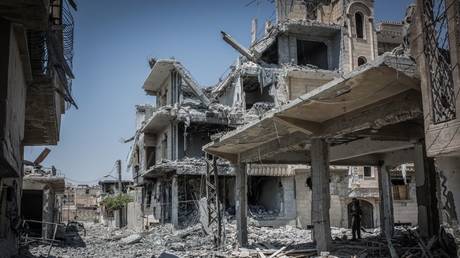Sen. Lindsey Graham says Syria might face the same bleak future Iraq saw when the US pullout in 2011 arguably gave rise to Islamic terrorism there, warning that sending US troops home will turn it into “Iraq on steroids.”
Graham (R-SC), who has styled himself as one of the main opponents of the withdrawal of 2,000 US troops from Syria, announced by President Donald Trump late last year, was speaking from Ankara when he urged Trump to take his time with the drawdown of forces.
"So I told President Trump – if you withdraw and do not think this through, you're creating a nightmare for Turkey," Graham said.
Also on rt.com US ‘slowing things down’ on troop withdrawal from Syria – top senatorThe hawkish senator has previously pleaded with Trump to "slow down" things in Syria, arguing that an immediate withdrawal would endanger Israel, embolden Iran, and incite a war between the Turkish forces "and our allies the Kurds."
Speaking on Saturday, Graham struck a far more conciliatory tone with Turkish officials compared to Trump, who last week threatened to "devastate Turkey economically" if it mounts an offensive on Kurds, while stressing that "it is now time" to bring the troops back home.
Graham said the US military is working on a plan together with the Turkish Army that would allow them to create a buffer zone between Turkey and Kurdish fighters in Syria "so that Turkey doesn't believe they are threatened by [the People's Protection Units] YPG elements in Syria."
READ MORE: Trump is willing to take military action in Syria again if needed – Pompeo
The YPG is the backbone of the Syrian Democratic Forces (SDF), a US-backed alliance of mainly Kurdish militias that have enjoyed Washington's protection throughout its campaign in Syria, including material support.
Graham said that in order to secure Turkey's interest, Kurds need to lay down heavy arms and move away from the Turkish border. Turkey remains a key NATO bastion in the Mediterranean and along with the Netherlands, Belgium, and Germany hosts 150 US-made B61 bombs.
In recent years, relations between the two allies have soured, in particular, over Washington's support for Kurdish militias, which Ankara considers an extension of the Kurdistan's Workers' Party (PKK) and therefore terrorists.
Despite worsening ties, Washington has refused to abandon the Kurds completely.
"And having said all of that, the people who fought with us against ISIS, we do owe them something," Graham said, noting that unless that complex preparatory work is done, US troops must stay in Syria.
He argued that otherwise, the war-torn country will follow in the footsteps of Iraq, but it would be even worse this time.
So If we don't think this through, this is going to be Iraq on steroids.
While US troops left Iraq in 2011, ending nearly nine years of the American war that began with the intervention in 2003, they returned in 2014 as the country, devastated by years of conflict and resurgent sectarian violence, was struggling with the advent of Islamic State (IS, formerly ISIS).
Iraq has been receiving a steady stream of financial aid from Washington, which has not worked out as planned, with a 2013 report by the Special US Inspector General for Iraq Reconstruction (SIGIR) finding that $60 billion allocated to the Middle Eastern country "had underperformed."
Iraqi woes are to a great extent linked to its infamously corrupt government, with Iraq's prime minister, Adil Abdul-Mahdi, acknowledging this month that the widespread corruption "has been distorting the image of the [Iraqi] state and society, and the reputation of its citizens in general."
In contrast with Iraq, Syria has a capable government that, with the help of Russia, has asserted itself by defeating IS and quashing attempts by the Western-backed opposition to oust it from power.
Think your friends would be interested? Share this story!

